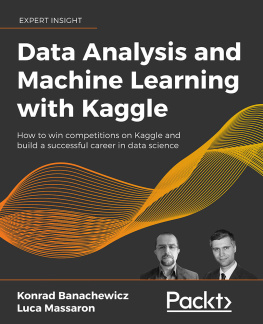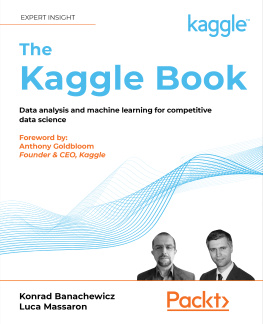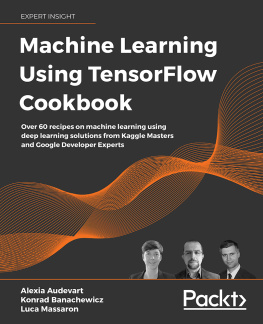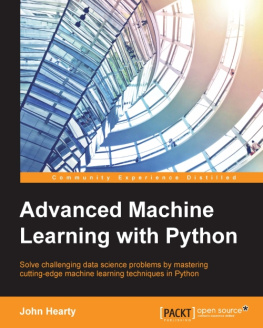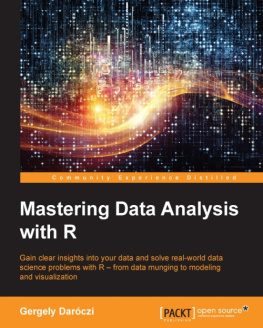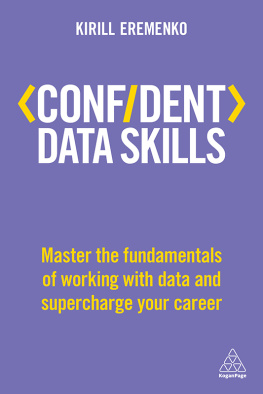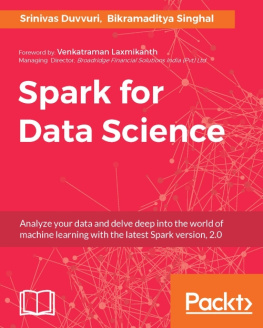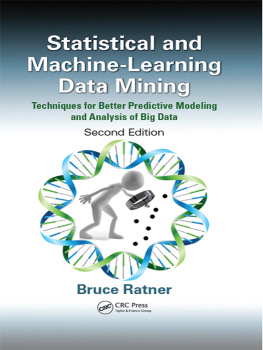Konrad Banachewicz - Data Analysis and Machine Learning with Kaggle: How to win competitions on Kaggle and build a successful career in data science
Here you can read online Konrad Banachewicz - Data Analysis and Machine Learning with Kaggle: How to win competitions on Kaggle and build a successful career in data science full text of the book (entire story) in english for free. Download pdf and epub, get meaning, cover and reviews about this ebook. year: 2021, publisher: Packt Publishing - ebooks Account, genre: Home and family. Description of the work, (preface) as well as reviews are available. Best literature library LitArk.com created for fans of good reading and offers a wide selection of genres:
Romance novel
Science fiction
Adventure
Detective
Science
History
Home and family
Prose
Art
Politics
Computer
Non-fiction
Religion
Business
Children
Humor
Choose a favorite category and find really read worthwhile books. Enjoy immersion in the world of imagination, feel the emotions of the characters or learn something new for yourself, make an fascinating discovery.
- Book:Data Analysis and Machine Learning with Kaggle: How to win competitions on Kaggle and build a successful career in data science
- Author:
- Publisher:Packt Publishing - ebooks Account
- Genre:
- Year:2021
- Rating:4 / 5
- Favourites:Add to favourites
- Your mark:
Data Analysis and Machine Learning with Kaggle: How to win competitions on Kaggle and build a successful career in data science: summary, description and annotation
We offer to read an annotation, description, summary or preface (depends on what the author of the book "Data Analysis and Machine Learning with Kaggle: How to win competitions on Kaggle and build a successful career in data science" wrote himself). If you haven't found the necessary information about the book — write in the comments, we will try to find it.
Get a step ahead of your competitors with a concise collection of smart data handling and modeling techniques
Key Features- Learn how Kaggle works and how to make the most of competitions from two expert Kagglers
- Sharpen your modeling skills with ensembling, feature engineering, adversarial validation, AutoML, transfer learning, and techniques for parameter tuning
- Discover tips, tricks, and best practices for winning on Kaggle and becoming a better data scientist
Millions of data enthusiasts from around the world compete on Kaggle, the most famous data science competition platform of them all. Participating in Kaggle competitions is a surefire way to improve your data analysis skills, network with the rest of the community, and gain valuable experience to help grow your career.
The first book of its kind, Data Analysis and Machine Learning with Kaggle assembles the techniques and skills youll need for success in competitions, data science projects, and beyond. Two masters of Kaggle walk you through modeling strategies you wont easily find elsewhere, and the tacit knowledge theyve accumulated along the way. As well as Kaggle-specific tips, youll learn more general techniques for approaching tasks based on image data, tabular data, textual data, and reinforcement learning. Youll design better validation schemes and work more comfortably with different evaluation metrics.
Whether you want to climb the ranks of Kaggle, build some more data science skills, or improve the accuracy of your existing models, this book is for you.
What you will learn- Get acquainted with Kaggle and other competition platforms
- Make the most of Kaggle Notebooks, Datasets, and Discussion forums
- Understand different modeling tasks including binary and multi-class classification, object detection, NLP (Natural Language Processing), and time series
- Design good validation schemes, learning about k-fold, probabilistic, and adversarial validation
- Get to grips with evaluation metrics including MSE and its variants, precision and recall, IoU, mean average precision at k, as well as never-before-seen metrics
- Handle simulation and optimization competitions on Kaggle
- Create a portfolio of projects and ideas to get further in your career
This book is suitable for Kaggle users and data analysts/scientists of all experience levels who are trying to do better in Kaggle competitions and secure jobs with tech giants.
Table of Contents- Introducing Data Science competitions
- Organizing Data with Datasets
- Working and learning with kaggle notebooks
- Leveraging Discussion forums
- Detailing competition tasks and metrics
- Designing good validation schemes
- Ensembling and stacking solutions
- Modelling for tabular competitions
- Modeling for image classification and segmentation
- Modeling for Natural Language Processing
- Handling simulation and optimization competitions
- Creating your portfolio of projects and ideas
- Finding new professional opportunities
Konrad Banachewicz: author's other books
Who wrote Data Analysis and Machine Learning with Kaggle: How to win competitions on Kaggle and build a successful career in data science? Find out the surname, the name of the author of the book and a list of all author's works by series.

